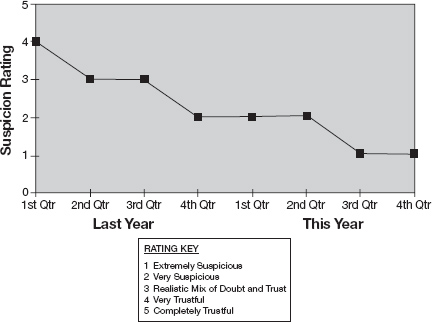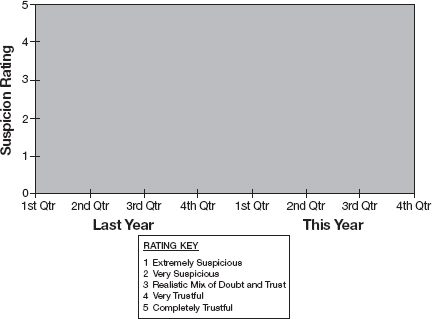CHAPTER 10
SUSPICIOUS
![]()
“Suspicion is the companion of mean souls.”
—Thomas Paine
Ever watchful, suspicious people believe that others are ready to attack, hurt, or even kill them. They protect themselves to live another day by spreading seeds of doubt in the minds of others. But suspicion spawns suspicion, and they wonder what others know that they don't. They are fearful that if they miss something, they'll lose out. They imagine others as double agents and informants. There are no other alternatives.
Research studies show that suspicious, mistrusting, and cynical people do not live as long as those who are not, even after taking into account age, smoking, alcohol use, and cholesterol level. In one study, test scores of suspiciousness clearly predicted the likelihood of a heart attack. Suspiciousness is unhealthy, say experts who study the connection between emotions and health.
THE CASE OF GEORGE AND THE MISTRUSTING MANAGER
“Hello, my name is George. I'm an engineer,” says a big man who looks successful and carries an expensive attaché case. He picks his words carefully and well.
“What I want to read to you are memos from my boss to his boss concerning my work. They think I'm going to jump ship with the company secrets, which are actually my own work.” As he reads the memos, he makes comments: “Things are miserable. My department head is suspicious of me. He's just about convinced our manager not to trust me too. Things are tough enough without having to worry about why people don't trust you anymore.”
Bill: That's a terrible story. I can see you're agitated. Suspiciousness rubs off, especially if it comes down from the top.
George: I like my position and my field. I've been with my company ten years, and I like what I've created for my company. I want to save the situation, but how do I break through and get my supervisors to trust me?
Bill: You've hit the problem on the head. It boils down to a question of trust. Would you mind answering some questions?
George: Anything, as long as it doesn't have to do with sex or politics.
We laughed. George sat down, breathed out slowly, and signaled that he was ready.
Bill: Do you believe that if you could learn to handle your department head's suspiciousness, you'd feel secure and satisfied in your job?
George: No question.
Bill: You will have to do the work required to accomplish that goal. Your department head isn't here, he will never be here, and you probably can't change him very much.
When one person, like you yourself, alters how he or she treats another person, that person too may undergo a change in attitude. You might win in two ways: get better control of a situation you don't like and help your department head learn something positive.
So let's begin. On a scale of 1 to 5, 1 stands for extremely suspicious, 2 for very suspicious, 3 for a realistic mix of doubt and trust, 4 for very trustful, and 5 for completely trustful. Think about your boss and rate his behavior on the 1–5 scale for each quarter of the past two years.
FIGURE 10-1. SUSPICION OVER TIME FOR GEORGE'S BOSS.

Figure 10-1 shows George's responses. Figure 10-2 is a graph for you to fill out for your own suspicion rating of a difficult person.
George: Well, I can see that things have gotten much worse over time. His suspiciousness didn't really bother me until recently, though. I thought being a little paranoid came with his job as manager of engineering, but he's going too far.
Bill: A little paranoia may be necessary when you are protecting your company's patents and processes from the competition. But when you mistrust coworkers, it can sabotage their motivation.
George: That's certainly true. So my boss is the way he is, and he probably won't change much, right?
Bill: There's an outside chance that you could affect his behavior. But he's not here—you are—and he wouldn't think anything is wrong. Since you don't want to leave, you need to find techniques to get him to trust you more. Then you'll feel better. You have to step back and get a more objective look at your behavior. Complete each of the following sentences, and let's see what it tells us about your attitudes:
FIGURE 10-2. SUSPICION OVER TIME FOR OUR DIFFICULT PERSON.

SUSPICIOUSNESS—UGH!
Complete the following sentences:
1. People who are suspicious make me feel _____________________________________________.
2. When I think of a suspicious person, I imagine _______________________________________.
3. Suspicious people are (list three):

4. A suspicious boss is ______________________________________________________________.
5. Suspicion is harmful because it ____________________________________________________.
Here are George's responses to the sentence-completion exercise. (Before you read them, fill out your own responses.)
1. People who are suspicious make me feel guilty.
2. When I think of a suspicious person, I imagine someone with a lot of power who can hurt other people.
3. Suspicious people are (list three):
Not happy people.
Are sick.
Might be smarter than the rest of us.
4. A suspicious boss is someone I can't get out of my mind.
5. Suspicion is harmful because it kills trust and motivation.
Examining the Clues: What George's Answers Mean
Bill: The elements you list include guilt, power, obsessive thoughts, and decreased motivation. Feeling guilt is your own hang-up. Assuming a suspicious person has the power to hurt you is also part of your attitude. George, not all people react with guilt and fear as you do. Furthermore, you dwell on it, can't get it out of your mind. So, of course, as you say, your motivation is killed.
George: You're telling me that I'm stuck, that it's a bad mix—poor chemistry between me and my boss.
Bill: Not quite. But you do have to inquire a little further into your attitudes. Now complete these sentences:
SUSPICIOUSNESS—UGHHH!
Complete the following sentences:
1. Suspicious people make me feel guilty because _________________________________________
![]()
2. Suspicious people appear to have a lot of power because ______________________________
![]()
3. The way to get a suspicious person to trust you is _____________________________________
![]()
Here are George's responses to the questions:
1. Suspicious people make me feel guilty because they pry and poke around, and who knows how they'll twist things.
2. Suspicious people appear to have a lot of power because they act as if they are the guardians of value and virtue, and the rest of us can't be trusted.
3. The way to get a suspicious person to trust you is to admit to everything, but that may not last too long either.
Cracking the Case: How George Can Build a Bridge of Trust to His Boss
Bill: Okay, George. Look at your answers and suggest a plan of action.
George: I see two things that I have to deal with. First, my boss never feels that he knows everything that is happening. He thinks people are hiding things. Maybe I need to give him every bit of information available to me. Write lots of memos and provide him with heaps of data. Tell him everything I'm doing. He needs quantity almost more than quality.
Second, he triggers guilt and fear inside me. But I have nothing to feel guilty about, and knowing all that I've contributed to the company, I should have nothing to fear. It's up to me to control those feelings. It's my problem, not his. I won't let him do it to me anymore.
I pity the poor guy. He's unhappy and looks it. I also know that he can be a danger to unsuspecting people.
George's boss is chronically suspicious. If George can make a dent, ignite even the smallest spark of trust, he will be performing a decent and humane deed. George's motivation? To save his self-esteem and protect the meaning of his job. Here are George's significant realizations:
- Suspicious people are never satisfied (history attests to this point).
- Suspicious people can be warded off for a time with quantities of information.
- Suspicion produces a climate of self-doubt; it is an attack on your integrity. George asked why he should feel guilty. He found no reason. He asked himself if he should be fearful. And again it proved to be groundless.
Now let's take the lessons in George's story and apply them.
What to Think
The suspicious person always needs a target—a victim. Suspicion can't go anywhere or do anything—cannot be satisfied—unless it attaches to someone or some group. The probabilities of your being correctly blamed (targeted), however, are very small. In other words, think:
“I am almost always without guilt.”
At work, you can seldom walk out of a bad scene. The suspicious boss, team leader, or coworker must be dealt with. You find your motives being questioned and your behavior placed under a microscope. Say to yourself and think,
“I'm not a bug to be played with. My motives are pure, my behavior good.”
Say, as George did,
“I pity the guy.”
What to Do
You must disentangle yourself from the suspicious person's web. You must say,
“I don't belong there; I've done nothing wrong.”
What you must never do, however, is pass suspicion down. Suspicion does breed more of the same, so if it starts with you, stop the process right there.
Watch yourself carefully. Watch for those “crazy thoughts” about others; they are often subtle and insidious. Suspicion can't grow in sunlight and truth. Therefore, once you begin to feel the virus of severe doubt and suspicion start to affect your ideas about friends and coworkers, seek help—not necessarily professional help, but help from a friend. Open dialogue will clear your mind and chase away the shadows.
Finally, do not believe anything the suspicious person says about you, either to your face or behind your back.
Say your boss accuses you of being late with a report and says it's because you misplaced it. You know it hasn't been misplaced, nor is it late. To prove you are guiltless, refer to the documentation and memos: “According to this note [memo, fax, etc.], the report was due on June 3, and I sent it to Paul, just as I was instructed to do.” Don't make the encounter into a contest, because you will seldom win. Don't get upset or defensive either. Don't let the old guilts—things that may bother all of us from time to time—surface and get in the way. Treat the situation in as matter-of-fact a way as you can. Don't get caught in the web!
Say you're accused of not doing your work as well as you should—in other words, of becoming a failure in your leader's eyes. You're being watched. The story is spread around that you're not working well. How do you handle your boss, and how do you stop the rumors? How, quite possibly, do you protect your career?
Your boss? Remember one rule: truth and sunshine. Present the facts, document them, and make the presentation; be calm, pleasant, and nonthreatening. Don't become cowed. Suspicious bosses go after people who appear vulnerable and yield to them, and ultimately they become their accomplice in spreading suspicion. It is absolutely necessary that you enter that war zone with the solid personal conviction that you are guiltless.
Your coworkers? Some will be strong and some weak. The weak ones will assume you are guilty; the strong ones will wait to see how you do in handling the boss. Once it's discovered—and it will be—that you cannot be intimidated and targeted, you'll find yourself with increased informal authority. You will be left alone. Sometimes an amazing thing will happen: Your career prospects will improve in the eyes of your boss's managers because you'll become defined as a strong person.
You can successfully confront suspicion only with your ego intact and your self-esteem high. The weak and fearful are easy marks. Don't become one.
